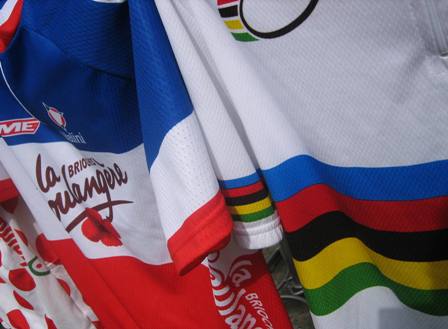
The editor's highly aspirational wardrobe
Edition number 7; dateline 28 March 2008
Showing the value of the F in 'funding' and the F in 'facilities'
At the risk of blowing any future competition to name the scenes depicted on the covers of The Leisure Review, this issue features an image of the sculpture at Manchester’s Sportcity, “The B of the Bang”. Currently fenced off, it makes a particularly apposite sporting metaphor. It is hugely expensive, incomplete, divisive and potentially dangerous but, for all its problems, it is also hugely impressive and genuinely uplifting. As one wanders along Alan Turing Way looking for a means to travel the few hundred metres from the velodrome to the National Squash Centre without climbing a fence or walking a mile in the wrong direction, the huge metallic starburst catches the light and draws you towards it like a day-time firework that looks all the better for months of rain and some sunshine.
At the time of going to ‘press send’ for this issue, the new boards of the velodrome were proving to be a good investment for British Cycling. The track ‘Worlds’ were giving up fast times and big medals for the British team, to the delight of packed grandstands and a live television audience thanks to the decision of BBC2 to give an hour of its evening schedule to the event every night. I’m delighted that we are able to carry the interview with John Mills, British Cycling’s director of coaching, education and development, in this issue, a conversation in which he gives a fascinating insight into how the sport of cycling has achieved its success and its plans for more. Working with the BBC team as an adept summariser, Jamie Staff, multiple world champion and one of the members of British Cycling’s Olympic Podium programme, gave a very different answer to the question ‘How has British Cycling done it?’ to John’s. Speaking from his perspective as an elite athlete, he was very quick to respond: “Lottery funding.”
It cannot be quite as easy to do as it was to say. Clearly there is a lot of commitment involved from all concerned. That Rebecca Romero has been able to become world champion in a scull and on a bike suggests that there is more than cash to her achievement, as does the fact, as revealed by Staff on the telly, that Romero bought a flat across the road from the velodrome to make sure that nothing as simple as a bus ride (or a fence) was going to stand in the way of success. And it is not just in sport that one finds such dedication. Elsewhere in this issue there is the story of Alison Watt, a celebrated artist, spending almost all her waking hours in the National Gallery over the course of a two-year associate residency. She too was not about to let an opportunity be missed for want of effort on her part.
The story of James McIlroy, who last month announced his retirement from 800m running because he could not face further debt while he pursued his athletics career (see World of Leisure for March), suggests that not all sports have got it right. A glance at the Premier League shows quite clearly that money has not solved all the problems sport has to face; it seems cricket may be about to go down a similar path. Whatever the rights and wrongs of McIlroy’s decision, it must have been a hard one to even consider, never mind take. He will probably watch the success at the velodrome and wonder whether, for all the money that has been invested in athletics, he didn’t pick the wrong sport.
Elite sportsmen and women may not always be good role model material (surely a debate for another time) and, speaking as someone who has done a few miles in his time, I can vouch for the fact that cyclists can be an odd bunch. However, it was great to see a group of people enjoying their success – and the success of fellow competitors and team mates – and recognising their good fortune at having funding and facilities at their disposal.
Jonathan Ives
Editor
letter from the editor
The Leisure Review editorial
